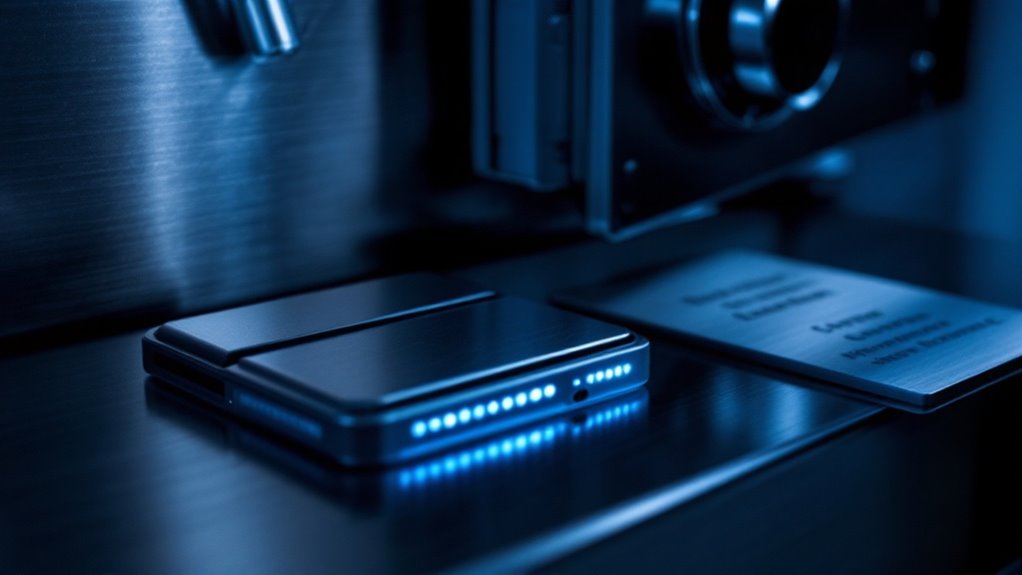Protecting cryptocurrency private keys requires a balanced approach between digital and physical security measures. Hardware wallets, encrypted storage, and offline backups form the foundation of robust protection. Smart investors employ multiple safeguards, including fireproof safes, metal backup plates, and biometric authentication. While modern solutions like multi-signature wallets offer enhanced security, time-tested principles of discretion remain vital. The evolving landscape of cryptocurrency security holds both promising innovations and sobering lessons about protecting digital wealth.

While the digital age has ushered in revolutionary ways to store and transfer wealth, protecting cryptocurrency private keys remains one of the most essential challenges faced by investors and enthusiasts alike. These alphanumeric codes, often appearing as inscrutable strings of 64 characters, hold the power to access digital fortunes or, if mishandled, vanish them into the ether forever. Never sharing private keys online is fundamental to maintaining their security.
The stakes couldn't be higher in this modern financial frontier, where traditional bank vaults have given way to encrypted hardware wallets and carefully guarded seed phrases. Like a master key to a digital fortress, private keys demand unprecedented levels of personal responsibility. Gone are the days when a friendly bank manager could help recover forgotten credentials – in the world of cryptocurrency, loss means permanent loss. Hardware Security Modules provide an extra layer of protection by storing private keys in tamper-resistant hardware.
In crypto's unforgiving realm, a single misplaced private key can transform digital wealth into nothing more than encrypted memories.
Security experts advocate for a layered approach to private key protection, much like ancient treasures were protected by multiple chambers and clever mechanisms. Cold storage solutions, such as hardware wallets that resemble humble USB drives, keep keys safely offline, while paper wallets – despite their deceptively simple nature – provide a time-tested backup method when properly secured from both prying eyes and natural elements. Modern hardware wallets incorporate secure elements to prevent physical tampering with stored keys.
The threats to private keys are as diverse as they are sophisticated. Digital pirates lurk in every corner of the internet, wielding phishing schemes and malware like modern-day cutlasses. Even the most technically savvy investors must remain vigilant against social engineering attacks that can be as subtle as a whispered secret or as bold as a false emergency.
Looking toward the future, innovative solutions like multi-signature wallets and biometric authentication are reshaping key security, while inheritance planning services address the delicate question of digital asset succession.
The irony isn't lost on many that these cutting-edge digital assets often rely on decidedly analog protection methods – fireproof safes, metal plates, and hidden physical locations that would make traditional treasure hunters feel right at home. In this brave new world of cryptocurrency, the age-old principles of security and discretion remain as relevant as ever.
Frequently Asked Questions
What Happens if I Lose My Private Key Backup Device?
Losing a backup device results in permanent loss of access to stored funds unless secondary backups exist. The user cannot recover or reset the private key through any central authority or service.
Can Quantum Computers Decrypt Private Keys in the Future?
Future quantum computers could theoretically decrypt private keys using Shor's algorithm. However, this capability remains decades away, requiring millions of qubits compared to today's hundred-qubit systems. Current cryptography remains secure.
How Often Should I Update or Change My Private Keys?
Private keys should only be changed when compromise is suspected, not on a routine basis. Frequent updates increase risk of errors without significant security benefits. Focus on secure initial generation and storage instead.
Are Hardware Wallets Completely Safe From Malware Attacks?
Hardware wallets are highly resistant to malware but not completely immune. While offline storage protects private keys, connected devices can still be compromised during transactions. Regular security updates and verification remain essential safeguards.
What's the Best Way to Share Private Keys With Trusted Family Members?
Rather than sharing complete private keys, one should implement a secure multi-signature setup or Shamir's Secret Sharing scheme, dividing access among trusted family members while maintaining overall security through distributed control.









